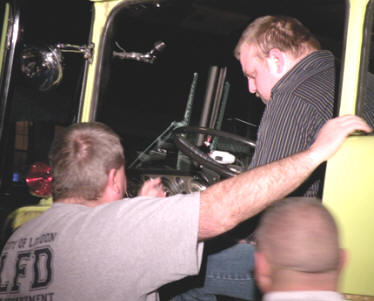Philadelphia
implements First Responders program

Residents of the city of Philadelphia soon will be able to rest easier, in the knowledge that emergency help, if needed, will be forthcoming more quickly.
Philadelphia volunteer firefighters are becoming certified as
First Responders, and will be dispatched by 911 Emergency
operators when help is needed.
For Philadelphia Fire Chief Jimmy Russell, who officially took
the reins of the fire department Jan. 1, First Responder
training was a top priority for 2010, the first step of many
improvements planned for the department this year.
Russell is a full-time firefighter for the city of Loudon, and a
part-time EMT (emergency medical technician) for Rural Metro
Ambulance Service. He was recruited last fall by Jimmy Manis,
former Philadelphia fire chief, to assume that volunteer role.
Since Russell came on board, the Philadelphia Fire Department
has grown, from a dozen or less volunteers to about 25. Some of
those volunteers bring considerable skills and training to the
table - assets that are desperately needed in the small town.
"We have 25 members, and 12 are EMT-IVs, (EMTs that are able to
start intravenous lines for treatment)," Russell said. "Rural
Metro is coming to help us implement First Responder training.
... to give us the protocols, of what we can and cannot do,"
Russell said.
T
he First Responder program requires 64 hours of training, above
and beyond the 120 hours of training a year required of
volunteer firefighters.
At 6 p.m., a time of day when most people are winding down for
the evening, a total of 18 volunteers reported to the fire
station at downtown Philadelphia Monday, Jan. 18, for training
sessions. They will continue fire training each month, preparing
for any contingency. "It is mandatory that we train each month,"
Russell said. But training and firefighting are only some of the
tasks Philadelphia volunteers face in the effort to improve
their community. Volunteers also are planning to convert a
large, unused room above Philadelphia Town Hall into a station
for Rural Metro units. The move will enable Rural Metro to
maintain ambulance service units for Philadelphia and nearby,
available 24 hours a day, lessening response times.
Russell said, "Rural Metro responds in Lenoir City and Loudon,
but they don't have first responders inside the city of
Philadelphia. Everybody has been forgetting Philadelphia."
When medical emergencies happen, minutes and seconds count,
Russell said. First Responders will be able to administer basic
emergency medical care, keeping the patient alive until
ambulances arrive. "Ambulances never get there fast enough,"
Russell said. "Three minutes might mean the difference between
somebody living or dying."
Brian Howard, Rural Metro Ambulance Service's Loudon County
director, said the first responders will be automatically
dispatched when emergency response is needed, and will be able
to arrive faster than the Rural Metro ambulances coming all the
way from Sugarlimb. "Our average response time is 10 to 12
minutes and responding to Stockton Valley can take 20 minutes,"
Howard said. "This should cut the response time in half. This
will be a good thing for Philadelphia."